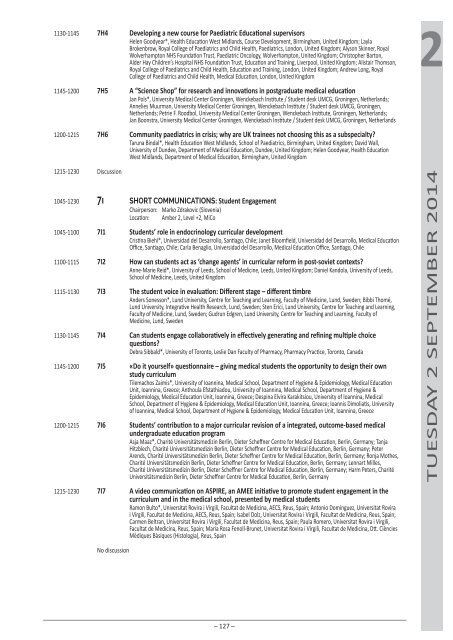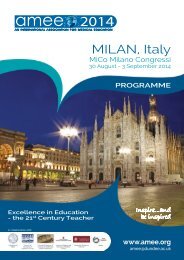Ac1xd
Ac1xd
Ac1xd
You also want an ePaper? Increase the reach of your titles
YUMPU automatically turns print PDFs into web optimized ePapers that Google loves.
2TUESDAY 2 SEPTEMBER 20141130-1145 7H4 Developing a new course for Paediatric Educational supervisorsHelen Goodyear*, Health Education West Midlands, Course Development, Birmingham, United Kingdom; LaylaBrokenbrow, Royal College of Paediatrics and Child Health, Paediatrics, London, United Kingdom; Alyson Skinner, RoyalWolverhampton NHS Foundation Trust, Paediatric Oncology, Wolverhampton, United Kingdom; Christopher Barton,Alder Hay Children’s Hospital NHS Foundation Trust, Education and Training, Liverpool, United Kingdom; Alistair Thomson,Royal College of Paediatrics and Child Health, Education and Training, London, United Kingdom; Andrew Long, RoyalCollege of Paediatrics and Child Health, Medical Education, London, United Kingdom1145-1200 7H5 A “Science Shop” for research and innovations in postgraduate medical educationJan Pols*, University Medical Center Groningen, Wenckebach Institute / Student desk UMCG, Groningen, Netherlands;Annelies Muurman, University Medical Center Groningen, Wenckebach Institute / Student desk UMCG, Groningen,Netherlands; Petrie F. Roodbol, University Medical Center Groningen, Wenckebach Institute, Groningen, Netherlands;Jan Boonstra, University Medical Center Groningen, Wenckebach Institute / Student desk UMCG, Groningen, Netherlands1200-1215 7H6 Community paediatrics in crisis; why are UK trainees not choosing this as a subspecialty?Taruna Bindal*, Health Education West Midlands, School of Paediatrics, Birmingham, United Kingdom; David Wall,University of Dundee, Department of Medical Education, Dundee, United Kingdom; Helen Goodyear, Health EducationWest Midlands, Department of Medical Education, Birmingham, United Kingdom1215-1230 Discussion1045-1230 7I SHORT COMMUNICATIONS: Student EngagementChairperson: Marko Zdrakovic (Slovenia)Location: Amber 2, Level +2, MiCo1045-1100 7I1 Students’ role in endocrinology curricular developmentCristina Biehl*, Universidad del Desarrollo, Santiago, Chile; Janet Bloomfield, Universidad del Desarrollo, Medical EducationOffice, Santiago, Chile; Carla Benaglio, Universidad del Desarrollo, Medical Education Office, Santiago, Chile1100-1115 7I2 How can students act as ‘change agents’ in curricular reform in post-soviet contexts?Anne-Marie Reid*, University of Leeds, School of Medicine, Leeds, United Kingdom; Daniel Kandola, University of Leeds,School of Medicine, Leeds, United Kingdom1115-1130 7I3 The student voice in evaluation: Different stage – different timbreAnders Sonesson*, Lund University, Centre for Teaching and Learning, Faculty of Medicine, Lund, Sweden; Bibbi Thomé,Lund University, Integrative Health Research, Lund, Sweden; Sten Erici, Lund University, Centre for Teaching and Learning,Faculty of Medicine, Lund, Sweden; Gudrun Edgren, Lund University, Centre for Teaching and Learning, Faculty ofMedicine, Lund, Sweden1130-1145 7I4 Can students engage collaboratively in effectively generating and refining multiple choicequestions?Debra Sibbald*, University of Toronto, Leslie Dan Faculty of Pharmacy, Pharmacy Practice, Toronto, Canada1145-1200 7I5 «Do it yourself» questionnaire – giving medical students the opportunity to design their ownstudy curriculumTilemachos Zaimis*, University of Ioannina, Medical School, Department of Hygiene & Epidemiology, Medical EducationUnit, Ioannina, Greece; Anthoula Efstathiadou, University of Ioannina, Medical School, Department of Hygiene &Epidemiology, Medical Education Unit, Ioannina, Greece; Despina Elvira Karakitsiou, University of Ioannina, MedicalSchool, Department of Hygiene & Epidemiology, Medical Education Unit, Ioannina, Greece; Ioannis Dimoliatis, Universityof Ioannina, Medical School, Department of Hygiene & Epidemiology, Medical Education Unit, Ioannina, Greece1200-1215 7I6 Students’ contribution to a major curricular revision of a integrated, outcome-based medicalundergraduate education programAsja Maaz*, Charité Universitätsmedizin Berlin, Dieter Scheffner Centre for Medical Education, Berlin, Germany; TanjaHitzblech, Charité Universitätsmedizin Berlin, Dieter Scheffner Centre for Medical Education, Berlin, Germany; PeterArends, Charité Universitätsmedizin Berlin, Dieter Scheffner Centre for Medical Education, Berlin, Germany; Ronja Mothes,Charité Universitätsmedizin Berlin, Dieter Scheffner Centre for Medical Education, Berlin, Germany; Lennart Milles,Charité Universitätsmedizin Berlin, Dieter Scheffner Centre for Medical Education, Berlin, Germany; Harm Peters, CharitéUniversitätsmedizin Berlin, Dieter Scheffner Centre for Medical Education, Berlin, Germany1215-1230 7I7 A video communication on ASPIRE, an AMEE initiative to promote student engagement in thecurriculum and in the medical school, presented by medical studentsRamon Bulto*, Universitat Rovira i Virgili, Facultat de Medicina, AECS, Reus, Spain; Antonio Dominguez, Universitat Rovirai Virgili, Facultat de Medicina, AECS, Reus, Spain; Isabel Dolz, Universitat Rovira i Virgili, Facultat de Medicina, Reus, Spain;Carmen Beltran, Universitat Rovira i Virgili, Facultat de Medicina, Reus, Spain; Paula Romero, Universitat Rovira i Virgili,Facultat de Medicina, Reus, Spain; Maria Rosa Fenoll-Brunet, Universitat Rovira i Virgili, Facultat de Medicina, Dtt. CiènciesMèdiques Bàsiques (Histologia), Reus, SpainNo discussion– 127 –



